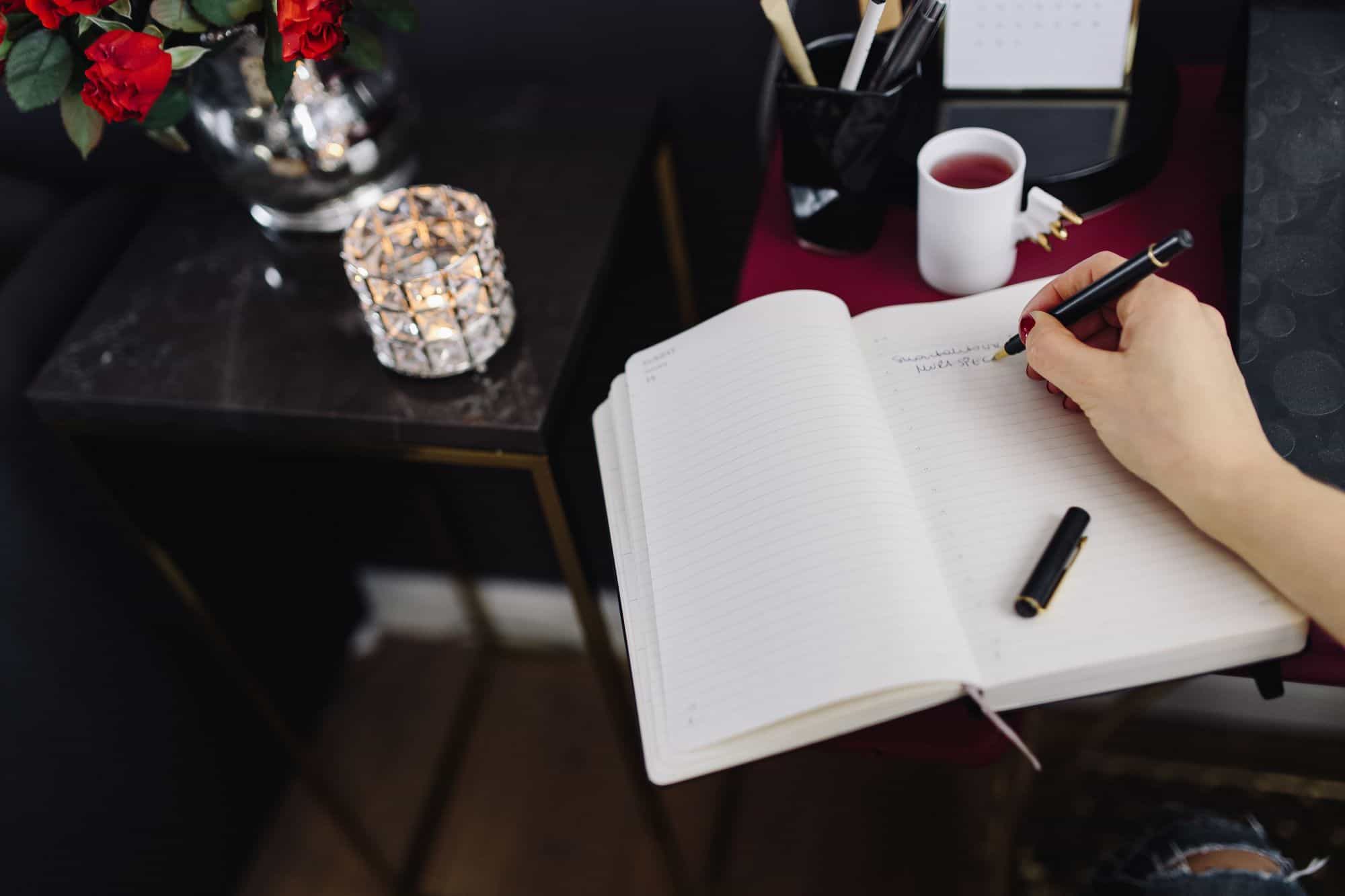While happiness is an inside job, I’m the first to admit that it’s easier said than done. It’s one of the reasons why I turn to a tool that anyone can use: a journal. Keeping a journal is a path to exploring your mind, your emotions, and your deeper desires. It’s an invitation that can help make you feel happier no matter how challenging life has been feeling.
Feeling grumpy? What about overwhelmed? Or possibly feeling those big emotions we equate as “good” like excitement? Are you on the edge of something bigger but you don’t know what it is? Trying to figure out what’s next?
Enter journaling. Because taking pen to paper allows you to process your thoughts and feelings. The words have an opportunity to spill out in ways we simply can’t access when those thoughts are just rolling around in your head. Your journal means that you aren’t keeping everything all bottled up. We start to feel unfocused and lost.
Journaling doesn’t have to be complicated. Think of it as a simple or even a nitty gritty practice. You can write in rambling run-on sentences. Or bullets. No need for proper grammar or sentence structure. It’s easy and accessible. And before you know it, you can discover ways to make you feel happier for at least a few moments a day.
You’d be surprised how just five minutes a day of writing can make you feel happier.
A Journal Can Help You Unwind After a Hard Day
It’s normal to want to talk about things when you’ve had a rough day. But you may notice that talking with a friend – or your partner – comes across as complaining. And that can keep you mired in the negative. And since you’re likely reading this because you are looking for tools to make you feel happier, a journal can be the answer.
Give yourself three to five minutes to write all the words and frustrations of your day on a page. Consider setting a timer. Push the pen hard into the paper and let any anger and anxiety flow into the words and out of you. You’re putting these thoughts into the world so they don’t have a hold on you anymore. Then you can leave your journal after five minutes and have a new, better attitude about the rest of your day.
You can also begin a process of finding the good within the negative. So, after writing for a few minutes about all the frustrations, ways you feel overwhelmed, and upset, look for what went right. Set a timer for three minutes and write down what was good, lovely, and right. Explore an unexpected kindness. Or even ways you can be kinder to yourself.
Figuring out How to Move Forward Can Help Make You Feel Happier
If you want to really learn how to make yourself feel happier, use your journal time as ways to move forward. Perhaps it’s as simple as writing a to do list, a wish list, or a bucket list. Maybe it’s a way to explore your goals. Or that niggling idea you had about reorganizing your home.
And on the most challenging of days, create a go-to guide for pulling your own self out of a rough day. With the commitment to do something on that list as soon as your journaling time is done.
Digging Into Your Past Can be Healing
Dwelling on the past can send you down the rabbit hole of feeling rotten. However, digging into your past can also be the path to letting go of the past so you can feel happier. Now, you may want to take longer than five minutes on this one.
To make writing in your journal about the past more healing than hurtful, focus on rewriting your the stories you tell yourself.
Look at a painful memory and then try to distill out the emotion and look for simple facts. When we can look at emotionally charged events from a space of logic, it helps take a bit of the sting out of the story. This also gives you an opportunity to decide you’re no longer going to let something that happened in the past continue to make you unhappy or feel less than about yourself. There is mighty power in making a decision!
Exploring What Your Relationships Have Taught You is Helpful and Healing
When you write in a journal, it often leads to you exploring and analyzing your relationships. Be it the relationship you had (or have) with parents, grandparents, teachers, and people you’ve met throughout your life. Especially if you can focus on who became teachers along life’s road, scary times, romantic times, and bad times.
Rather than looking at what went wrong, looking at what you’ve learned opens the door to help make you feel happier.
For example, I realized how my mom influenced my love of reading and writing. Oh, and my insatiable sense of curiosity. My father filled me with not just kindness, but a strong work ethic. And my grandmother taught me all about unconditional love.
Best of all, writing in a journal allows you to dig into the one relationship you will always have: the one with yourself.
You Can Create a Lasting Habit that Nourishes You
You may be clunky at first and forget to journal for a couple of days in a row. That’s okay, building habits doesn’t happen overnight. Find what works for you and your schedule and be kind to yourself as you embark on this new adventure discovering your inner self and reflecting on your day!









